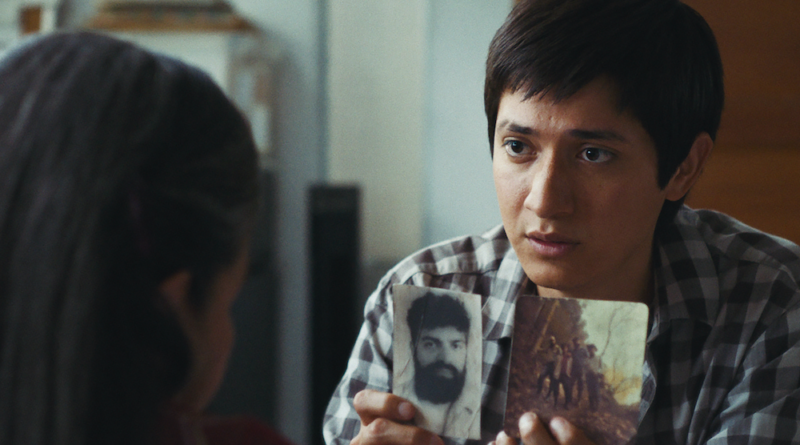INTERVIEW: Cannes winner ‘Our Mothers’ confronts Guatemala’s past
Photo: Armando Espitia stars in Our Mothers, a new film by writer-director César Díaz. Photo courtesy of Outsider Pictures / Provided with permission.
Our Mothers, the new movie from filmmaker César Díaz, takes a poignant and difficult look at the continued aftermath of the civil war that plagued Guatemala. The film, which is now available virtually, follows the lead character of Ernesto (Armando Espitia), a young anthropologist working for the Forensic Foundation and helping to unearth mass graves around the country. He is professionally driven to bring solace and closure to many families who were touched by the war, but he’s also personally driven because he hopes to one day to discover the true story of his own father.
The anthropologist eventually takes on a new case helping an older woman who believes she knows where the remains of her husband are in a rural village outside the capital. Ernesto heads to this village, not knowing what he might unearth. Helping Ernesto in his journey is his dedicated mother (Emma Dib). Together what they find is startling and the first step in the healing process.
“There’s many layers, I think, many motivations,” Díaz said in a recent phone interview about his inspiration to create Our Mothers (Nuestras Madres). “First of all, I think my own personal story having a missing father, and then I think the fact that I was trying to explore the mother-son relationship, which is for me very important and opens many paths and many windows. Later on, I discovered the Forensic Foundation work, giving back the bodies and answers to the victims. The last thing I think was the encounter with the women in the village, the real victims in the village. I think there’s not only one motivation. I think there are many layers there.”
For Díaz, the character of Ernesto is a stand-in for an entire generation of people who lost a parent during the conflict, which lasted from the 1960s to the 1990s. He said these people are trapped between two worlds. In the past, there’s much conflict and hurt, much of it unresolved, and in the present there’s a striving for social justice. Around these lost souls is a country that is sometimes reluctant to remember the atrocities of previous years.
“I think many people of my generation are trapped in this kind of situation,” he said.
To craft the narrative, Díaz needed to rely on the expertise of a close friend who knew the ins and outs of the world of forensics. She introduced him to the ongoing work happening in Guatemala and the many people impacted by these excavations and digs.
“It was an amazing experience because the science allowed people to mourn and close a chapter in their lives,” he said. “They do this job, which is to try to understand what happened to the body. … There’s one thing that always moved me a lot, which is the fact how the bones at the beginning are only bones, and little by little they became a human being.”
[Read Hollywood Soapbox’s review of Our Mothers.]
The director decided to cast the mother and son characters with professional actors. Everyone else in Our Mothers are first-time performers. At first, he even wanted the leads to be played by nonprofessionals, but he realized during the casting process that he needed to work with a pair of actors who could convey the many emotions of these two central roles.
“I need people that can represent those characters, so I start doing a professional casting in Mexico because they’re the only country in the region that has a real industry,” Díaz said. “Also, because for historical reasons, many of the people that went away in exile, like me, we went to Mexico, and we came back with a different accent. We speak a little bit different than regular Guatemalan people, and I don’t want the actors to fake an accent. … So that’s why I went to Mexico to do this casting. I found Armando Espitia, who portrays Ernesto; he was the first person I met during the casting.”
Now that the movie has been released virtually and won acclaim from critics, including taking home the Camera D’Or at the Cannes Film Festival, Díaz can look back and realize that he has advanced the conversation in Guatemala. He has promoted a simple edict: the country must come to terms with its past if it has any hope of moving forward.
“I’m convinced of it,” the director said. “I’m convinced. You have these open wounds in the country, and … you need to clear this past. And to clear this past, you need justice, and you need reconciliation, a movement — but coming from the state, coming from a national way. I think the problem right now is we are not doing this kind of work. We are not even doing the remembering work, trying to put up some monuments and some special days or some kind of celebration. We’re just trying to erase the past and trying to imagine that the history begins with us, and I think this only makes the open wounds more painful in the end.”
By John Soltes / Publisher / John@HollywoodSoapbox.com
Our Mothers, directed by César Díaz, is now available to stream from Outsider Pictures. Click here for more information.

